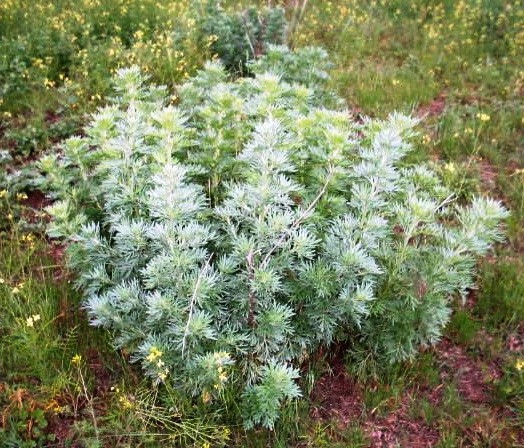
What Weeds Tell Us
As an avid gardener I meditate upon the issues of life while tending my plants. It is a most fruitful adventure and opportunity to observe the creation in vivid close-up view, to watch seeds germinate and emerge from fertile soils, grow from helpless little juveniles to hearty adults, all for the express purpose of feeding us people the various minerals, vitamins, carbohydrates, protein, fats, and a myriad of other biochemicals that are fabricated into our bodies to build and sustain us.
Watching these marvelous creations of the plant kingdom live out their lives in sacrifice to us gives rise to some deep introspection about the Creator Himself, for as He says in Romans 1:20,
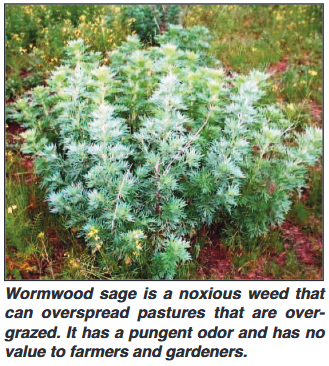 “For since the creation of the world His invisible attributes are clearly seen, being understood by the things that are made, even His eternal power and Godhead, so that they are without excuse.”
“For since the creation of the world His invisible attributes are clearly seen, being understood by the things that are made, even His eternal power and Godhead, so that they are without excuse.”
So, God reveals Himself throughout the creation, if we will only look. Believe it or not, the Eternal reveals things not just about Himself in the creation, but about the Adversary as well … for that spirit is highly active in the world, as indeed it is in gardens. How is that so? Let me explain, and you will quickly see how the forces of good and evil, of truth and fiction, and of the Eternal’s overall plans are distinctly written within the pages of a garden … sometimes in places you might least expect.
What I am going to focus on in this paper is weeds. Yes, weeds, those plants that of and by themselves are quite miraculous and beautiful in their own right, but are enemies in a garden setting. They are “plants growing out of place.” In the proper environment they are most welcome, providing food, shelter, and beauty for animals and insects, and they help protect the earth from the ravages of soil erosion. However, when they compete with my plants in the garden they become my enemies, for they compete with the carrots, cabbage, tomatoes, and melons for nutrients, sunlight, and water. They cannot coexist with my food crops without detracting from their yield for the table. They must by all means be removed!
The same can be said about weeds in the pasture, where grasses and certain broad-leaved plants serve as food for the cattle that graze there. Let us examine two of these weeds and see what they teach us about God and His ways, in particular the sins that may corrupt us.
Wormwood
Better known as Absinth Wormwood (Artemisia absinthium L.), this plant is a member of the sagebrush family and has a strong sage odor. Unlike other members of the sage family, it dies back to the crown each winter, and new shoots emerge in the spring. Because of its sage flavor, the flower heads can be harvested for their aromatic oil to prepare vermouth and absinth; the oil also has antiseptic properties.
The plant’s appearance is actually quite beautiful, silvery and up to five feet high when mature. However, it will take over pastures that are overgrazed, so is now classified as a noxious weed in some states. Also, the pollen can seriously affect allergy sufferers during blossoming in mid to late summer.
My small farm in eastern South Dakota is a perfect habitate for wormwood. It flourishes throughout the pasture and prairie areas, sometimes even appearing out of nowhere on the lawn. Despite the fact that I rather like the plant, it just has to go.
In the process of eradicating this troublesome plant I have discovered a number of tactics it uses to survive. Wormwood lives up to its name:
“Then the third angel sounded. And a great star fell from heaven, burning like a torch, and it fell on a third of the rivers and on the springs of water. The name of the star is Wormwood. A third of the waters became wormwood, and many men died from the water, because it was made bitter” (Revelation 8:10-11).
wormwood = apsinthose, “a plant both bitter and deleterious, and growing in desolate places, figuratively suggestive of ‘calamity.’”
1. Wormwood will overtake a pastureland that is abused and overgrazed. When the natural grass is denuded by overgrazing, conditions are ripe for the seeds scattered for years over the landscape — by wind, bird droppings, or previous infestations — to germinate. The competitive pressure of beneficial grasses is reduced, opening opportunities for wormwood to prosper.
In the same way, consider the rich farmer whose soils yielded plentifully. He is like the lush grass of a well-watered pasture. Its plush grasses outcompete weeds like wormwood, and the cattle graze and prosper. Then the farmer said,
“What shall I do, since I have no room to store my crops?…. I will pull down my barns and build greater, and there I will store all my crops and my goods. And I will say to my soul, ‘Soul, you have many goods laid up for many years; take your ease, eat, drink, and be merry.’ But God said to him, ‘Fool! This night your soul will be required of you; then whose will those things be which you have provided?’” (Luke 12:17-21).
Like the farmer in this parable, a person who lays up treasure for himself and is not rich towards God will fall into calamity, likely forgetting about his need to steward the land, and in this pride will overgraze his pastures and allow weeds to get the upper hand. A mind at ease, one that is not wary of the pernicious hand of the devil who is always on the prowl to devour any hapless soul (I Peter 5:8), will slide into various sins.
“Pride goes before destruction, and a haughty spirit before a fall” (Proverbs 16:18).
The weeds of sin proliferate when the fertile soil of God’s truth does not support the lush growth of love, joy, peace, longsuffering, kindness, goodness, faithfulness, gentleness, and self-control (Galatians 5:22-23). These weeds will shroud the grasses and starve them of sunlight, and rob moisture and nutrients, removing the good works that we are required to exercise:
“For we are His workmanship, created in Christ Jesus for good works, which God prepared beforehand that we should walk in them: (Ephesians 2:10).
2. Wormwood is oftentimes found in fields and pastures nestled and camouflaged alongside thistles. In fact, in my own efforts to eradicate wormwood I carefully examine thistle patches for these plants hiding amongst the thorny leaves. Usually I find some.
Satan is a lover of darkness. He camouflages himself amongst beautiful and pleasant trees and plants, even as he did in the Garden of Eden. In that lush, productive garden in which “… the Lord God made every tree grow that is pleasant to the sight and good for food” (Genesis 2:9), Satan lurked to approach Eve and deceive her into partaking of the tree of the knowledge of good and evil. He made what is aberrant to the Creator look acceptable and good.
“Then the serpent said to the woman, ‘You shall not surely die. For God knows that in the day you eat of it your eyes will be opened, and you will be like God, knowing good and evil’” (Genesis 3:4-5).
“And no wonder! For Satan himself transforms himself into an angel of light” (II Corinthians 11:14).
The devil is a liar and a murderer (John 8:44) who tries to hide his evil intent. He pretends to be good and loving, like wormwood growing alongside thistles in the field, defying the farmer’s intent to search out this villanous weed that will prosper and spread over the land once given a chance, once the cattle overgraze and denude the pasture of its nourishing grass, leaving the worthless wormwood. Recall that we are the people of His pasture, the sheep of His hand (Psalm 95:7) which wormwood — Satan the devil — would love to overtake and make unfruitful, overtaking the soil’s fertility, moisture, and sunlight by which the true children of God grow and prosper.
“But others [seeds] fell on good ground, sprang up, and yielded a crop a hundredfold … but the ones [seeds] that fell on the good ground are those who, having heard the word with a noble and good heart, keep it and bear fruit with patience” (Luke 8:8,15; see also Matthew 13:8, 23; Mark 4:8, 20).
3. Wormwood is hard to eradicate. Herbicides that will easily kill thistles oftentimes will not so easily kill wormwood. Not only that; its seeds can rest in the soil for many years, and when conditions are just right — an open space in the field or pasture, proper rainfall, and ideal temperature — they will germinate in profusion.
In the same way, Satan’s character — his insidious wavelength — will proliferate upon the soil of our hearts and minds once the proper environmental conditions arrive. Notice some of these conditions in the Parable of the Sower I just mentioned in point 2.
(a) “When anyone hears the word of the Kingdom, and does not understand it, then the wicked one comes and snatches away what was sown in his heart. This is he who received seed by the wayside” (Matthew 13:19).
(b) “But he who received the seed on stony places, this is he who heard the word and immediately receives it with joy: yet he has no root in himself, but endures only for a while. For when tribulation or persecution arises because of the word, immediately he stumbles” (Matthew 13:20-21).
(c) “Now he who received seed among the thorns is he who hears the word, and the cares of this world and the deceitfulness of riches choke the word, and he becomes unfruitful” (Matthew 13:22).
While wormwood will thrive on good soil, it prospers best when no aggressive and thriving grasses leave no room for it. A fertile, well-watered soil sown to competitive grasses leave little space for this weed to gain the upper hand. God’s spirit that protects seeds from being devoured by wayside birds, from drying out upon rocks, and from being overtaken by thorns and thistles will prevent wormwood from taking hold in the field. The fruits of God’s spirit —love, joy, peace, patience, kindness, faithfulness, etc. — will occupy the soil of life and leave no room for Satan’s character to express itself: adultery, fornication, uncleanness, idolatry, sorcery, contentions, jealousies, and envy (Galatians 5:17-23).
4. Wormwood is beautiful to look upon, but it is worthless as a feed, and good only for alcoholic drinks. Notice the nature of Satan, known as Lucifer [heylel, “to shine or make a show”], also personified by the “King of Tyre” in Isaiah 14:12-17 and Ezekiel 28:12-19.
“You were the seal of perfection, full of wisdom and perfect in beauty. You were in Eden, the garden of God; every precious stone was your covering: the sardius, topaz, and diamond, beryl, onyx, and jasper, sapphire, turquoise, and emerald with gold. The workmanship of your timbrals and pipes were prepared for you on the day you were created” (Ezekiel 28:12-13).
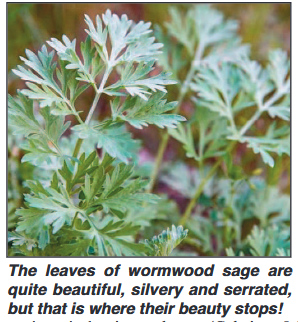 Satan appears to be a beautiful super-being, the nachash, or brilliant shining spirit being who appears as an angel of light (II Corinthians 11:14). Yet, inside he is a deceptive shell of filth, belying his appearance of brilliance to the world.
Satan appears to be a beautiful super-being, the nachash, or brilliant shining spirit being who appears as an angel of light (II Corinthians 11:14). Yet, inside he is a deceptive shell of filth, belying his appearance of brilliance to the world.
Not only that, but wormwood is used to flavor vermouth and absinth. These alcoholic beverages, like all distilled alcoholic drinks, are harmful to the human body, imparting not only drunkenness but also ill health … unlike wine, which, while it can also be consumed in excess (Proverbs 20:1; Acts 2:13), is in moderation a very good health benefit (I Timothy 5:23; Psalm 104:5), which even our heavenly Father advocates (Judges 9:13; Isaiah 25:6; Proverbs 9:1-5; Song of Solomon 1:2; 4:10; 5:1; 7:2).
Field Bindweed
There is a weed even more insidious and abhorrent than wormwood, in my experience. That is field bindweed, also known as creeping Jenny and devil’s gate (Convulvulus arvensis). Imported from Europe and first reported in Virginia in 1793, this is noted as one of the worst weeds in the world.
The vining perennial can grow out to six feet, and forms mats of leaves and vines on the ground as the plant searches for something to climb on. The leaves resemble arrowheads, and the blossoms are trumpet-shaped and about 0.75-inch long. Because of its noxious reputation and threat to gardeners and farmers, a great deal of research on its control has been performed.
The weed is extremely difficult to control, since the most impressive part of its life is underground. The plant creates a system of roots both vertically and horizontally. A single plant in one growing season can spread underground up to 18 feet horizontally and 20 feet deep. Adventitious buds from the roots and rhizomes can create new shoots and roots. A new plant can develop from as little as three inches of root buried 14 feet deep. The shoots start to build a new root system after the first 7 to 10 days from emergence.
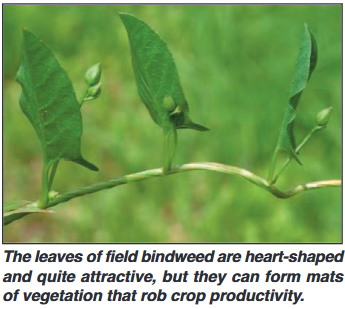
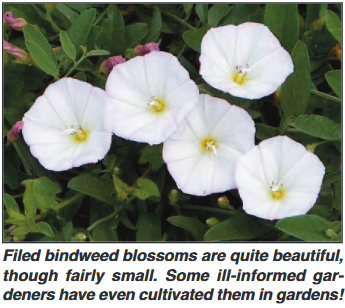 Due to its extensive underground root system, field bindweed is incredibly difficult to control. Eradication requires persistent removal of the new growth from its first emergence in the spring, and then every week as new shoots emerge throughout the growing season. If left to grow unimpeded, it can reduce field crops by 50% or more as its roots consume water and fertility from the soil, robbing the crop of resources. Land which has become infested with field bindweed can lose a goodly part of its value, making farming it unprofitable unless broad-spectrum herbicides are used, such as glyphosate, for genetically modified crops. Even then the weed may appear for up to three years. Control in gardens and border areas is especially difficult because of the variety of beneficial plants it intermingles with that herbicides will also kill.
Due to its extensive underground root system, field bindweed is incredibly difficult to control. Eradication requires persistent removal of the new growth from its first emergence in the spring, and then every week as new shoots emerge throughout the growing season. If left to grow unimpeded, it can reduce field crops by 50% or more as its roots consume water and fertility from the soil, robbing the crop of resources. Land which has become infested with field bindweed can lose a goodly part of its value, making farming it unprofitable unless broad-spectrum herbicides are used, such as glyphosate, for genetically modified crops. Even then the weed may appear for up to three years. Control in gardens and border areas is especially difficult because of the variety of beneficial plants it intermingles with that herbicides will also kill.
Given these facts about field bindweed, how is one to deal with it? It has a nature like Satan himself, growing profusely to overpower every plant in sight, and being persistently rooted in the fertile soil of field and garden.
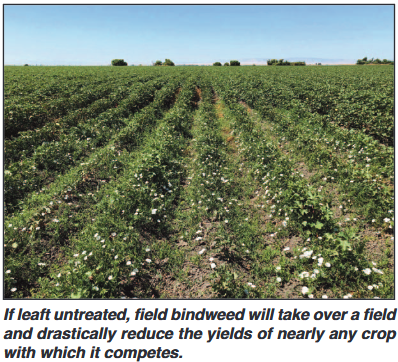 When my wife and I moved to the Northern Plains in 2012, we had to choose a place on our 16-acre homestead for a garden. The location we chose was wonderfully fertile and in a sunny, exposed area. The slope was gentle, and by all accounts it appeared that this was an ideal place for a garden. Indeed it was … until that first spring we began to see field bindweed vines emerging over a goodly portion of the 0.2-acre area!
When my wife and I moved to the Northern Plains in 2012, we had to choose a place on our 16-acre homestead for a garden. The location we chose was wonderfully fertile and in a sunny, exposed area. The slope was gentle, and by all accounts it appeared that this was an ideal place for a garden. Indeed it was … until that first spring we began to see field bindweed vines emerging over a goodly portion of the 0.2-acre area!
I was aware of the insidious character of this noxious weed, but had never dealt with it personally. I recalled the incidence of a small area of field bindweed in a neighboring field alongside the home farm in Minnesota. The area of perhaps 100 feet in diameter had been treated with a soil sterilant, so crops would not grow there for many years … so intent was the farmer to rid the field of this crop-devouring weed.
Thus began a three-year program to eradicate field bindweed from our garden. The plan was simple: grant the enemy no quarter, and attack it whenever it showed itself! This we practiced with a vengeance. Whenever a sprig of bindweed emerged, I dug next to it with a spade and tipped the spade, snapping the root as deeply as possible, thus removing as much energy as possible from the soil. The offending vines were cast out of the garden to dry and die. This procedure was repeated continously throughout the spring, summer, and fall.
In addition, a mulch of four layers of newspapers and mulch hay on top covered all of the interrows. Only bindweed in the crop rows themselves had to be dug. Yet, even then the bindweed slithered and snuck between the layers of newspaper to try and find an escape route … which it sometimes did. The vines emerging from an overlap in the newspapers were tracked — sometimes several feet — to their origin, and then dug.
These procedures persisted for all of the growing season. The next year there were somewhat less vines emerging, but we continued the assault on these pesky plants. The third year there were very few plants that emerged as the deep root system became depleted. By summer’s end there were hardly any plants to dig. The fourth year there may have been a plant or two, and those were removed. The battle had been won … except for a few bindweed plants that presented themselves in the border flowers and on into the lawn beyond. These plants I treated individually with a root-killing herbicide. The plants were gone. The battle had been won. Even so, I have been ever-vigilant to detect any possible reemergence of bindweed in the garden, flowers, and lawn, lest a seed germinate and renew the invasion.
What does field bindweed teach us about our adversary Satan the Devil? Several things.
1. Like field bindweed, if left unchecked the Adversary will grow and grow, matting over entire areas of fields and gardens, consuming sunlight, water, and fertility. It will overpower the good fruits one is trying to grow for building up individuals and families. Its roots wil penetrate deeply into the fertile soil of one’s character and remain there until its life-blood of nutrients from the leaves above-ground are diminished. If allowed to grow unimpeded, the bindweed can totally overcome fruitful plants, like the Devil when he possesses a person whose will has been captured (Matthew 4:24; 8:16, 28-33; 9:32; 12:22; etc.).
We are admonished to resist the advance of the devil with the power of our will, so he will not claim any place in our lives.
“Therefore submit to God. Resist the devil and he will flee from you. Draw near to God and He will draw near to you.Cleanse your hands, you sinners, and purify your hearts, you doubleminded” (James 4:7-8).
“Be sober, be vigilant, because your adversary the devil walks about like a roaring lion, seeking whom he may devour. Resist him, steadfast in the faith, knowing that the same sufferings are experienced by your brothers in the world” (I Peter 5:8-9).
The wiles of Satan must be uprooted continually, for his assaults on us are relentless. He will look for a weakness by which he may enter our lives and influence us … grow vines across our character that may look beautiful as bindweed blossoms, but whose fruits are filled with carnality and death.
“Now the works of the flesh are evident, which are adultery, fornication, uncleanness, lewdness, idolatry, sorcery, hatred, contentions, jealousies, outbursts of wrath, selfish ambitions, dissensions, heresies, envy, murders, drunkenness, revelries, and the like …” (Galatians 5:19-21).
Once deeply rooted through unimpeded growth, these fruits of the flesh are difficult to remove. The roots will send up new shoots day after day, which the new creation in Christ must pull out — snap off the roots — as soon as they appear. Day after day the battle is waged as the ungodly beast of carnality is ripped from its domain in our lives, and the old habits die.
“For the weapons of our warfare are not carnal but mighty in God for pulling down strongholds, casting down arguments and every high thing that exalts itself against the knowledge of God, bringing every thought into captivity to the obedience of Christ” (II Corinthians 10:4-5).
“Therefore, since Christ suffered for us in the flesh, arm yourselves also with the same mind, for he who has suffered in the flesh has ceased from sin, that he no longer should live the rest of his time in the flesh for the lusts of men, but for the will of God. For we have spent enough of our past lifetime in doing the will of the Gentiles — when we walked in lewdness, lusts, drunkenness, revelries, drinking parties, and abominable idolatries. In regard to these, they think it strange that you do not run with them in the same flood of dissipation, speaking evil of you” (I Peter 4:1-4).
The old man’s carnal nature will continually want to rear up its ugly head — beak through the fertile soil and overtake the good crops — so must be crucified day after day, week after week, month after month, year after year.
“… knowing this, that our old man has been crucified with Him that the body of sin might be done away with that we should no longer be slaves of sin” (Romans 6:6).
“I have been crucified with Christ; it is no longer I who live, but Christ lives in me; and the life which I now live in the flesh I live by faith in the Son of God, who loved me and gave Himself for me” (Galatians 2:20.
Those seeds of bindweed resting in the soil, waiting for a chance to germinate and overtake a life redeemed from sin, must be prevented from germinating, or if they do germinate they must be quickly hoed out. Newly germinated plants are easy to remove; those that have developed deep roots are harder to expunge. Vigilance must be exercised to carefully examine the soil of one’s life to spy any germinating seeds of carnality and cast them out.
2. The roots of Satan in one’s life can run deep and persistent, like field bindweed’s roots that penetrate the soil to many feet. Unless effort is put forth to deprive them of nourishment, they will continually send up evil shoots into the light of one’s life and shroud it with darkness … even while they claim to be bringers of light.
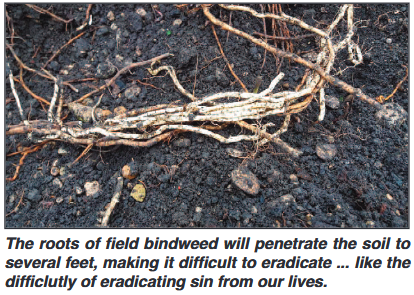 Habits run deep. Bad habits will continue to express themselves throughout one’s life unless some major decision is made to change them. That change is usually motivated by some great upheaval or calamity, bringing on introspection and necessary alteration of those habits. Oftentimes that stress remains, while the victim of it refuses to look internally at his or her condition. Such is the case of alcoholics or drug users that know their habit is killing them, or of cancer victims who expect surgery, radiation, or drugs to cure them, whereas a radical conversion to a Godly diet and thought pattern would grant them healing. Recall that Paul reminded the brethren at Corinth that “… he who eats and drinks in an unworthy manner [anaxios, ‘irreverently’] eats and drinks judgment [‘a decision’; from krino, ‘to decide’] to himself, not discerning [diakrino,‘to separate throughly, to decide’] the Lord’s body” (I corinthians 11:29). As a result of this, Paul states in the next verse that many — not just a few — were weak and sick among them, and many had died.
Habits run deep. Bad habits will continue to express themselves throughout one’s life unless some major decision is made to change them. That change is usually motivated by some great upheaval or calamity, bringing on introspection and necessary alteration of those habits. Oftentimes that stress remains, while the victim of it refuses to look internally at his or her condition. Such is the case of alcoholics or drug users that know their habit is killing them, or of cancer victims who expect surgery, radiation, or drugs to cure them, whereas a radical conversion to a Godly diet and thought pattern would grant them healing. Recall that Paul reminded the brethren at Corinth that “… he who eats and drinks in an unworthy manner [anaxios, ‘irreverently’] eats and drinks judgment [‘a decision’; from krino, ‘to decide’] to himself, not discerning [diakrino,‘to separate throughly, to decide’] the Lord’s body” (I corinthians 11:29). As a result of this, Paul states in the next verse that many — not just a few — were weak and sick among them, and many had died.
What is Paul saying here? Is he not saying that because these brethren would not repent of their destructive habits, or in other words would “drink [of] this cup of the Lord in an unworthy manner” (I Corinthians 11:27), they were guilty of the body and blood of Christ, which would give them abundant, healthful life if they would but follow in His footsteps? This means repenting, changing one’s lifestyle from past errors once they are revealed. This means casting out physical, mental, and spiritual sins.
Satan’s roots run deeply through society, he being the god of this world, as we have already discussed (Matthew 4:8-9; etc.). He wishes to bring all people to his carnal state and have them seek after fulfilling the senses for the senses’ sake. Those godless roots have indeed captured the hearts and minds of so many people, so that the glorious good news of Christ’s coming kingdom might not shine onto them. (II Corinthians 4:4). It is this root that is described so eloquently in Isaiah 5:22-24.
“Woe to men mighty at drinking wine, woe to men valiant for mixing intoxicating drink, who justify the wicked for a bride, and take away justice from the righteous man! Therefore, as the fire devours the stubble, and the flame consumes the chaff, so their root will be as rottenness, and their blossom will ascend like dust; because they have rejected the law of the Lord of hosts, and despised the word of the Holy One of Israel.”
This degenerative root of Satan’s character is the opposite of Christ’s, who is likened also to a root, but a righteous one.
“For He shall grow up before Him [the Father] as a tender plant, and as a root out of dry ground” (Isaiah 53:2).
“But one of the elders said to me, ‘Do not weep. Behold, the Lion of the tribe of Judah, the Root of David, has prevailed to open the scroll and to loose its seven seals’” (Revelation 5:5).
Satan’s roots are buried deeply within today’s society, but they can be starved of energy by failing to give them the sustenance of lawlessness. Those deeply-set roots are shuttered in darkness, even as Satan is the purveyor of darkness (John 3:19; Acts 26:18; Ephesians 6:12; Jude 6).
3. Field bindweed produces beautiful leaves, tendrils, and flowers. Yet, the end result of this infestation is loss of productive yield in one’s field or garden. Satan in this world is transformed into an angel of light.
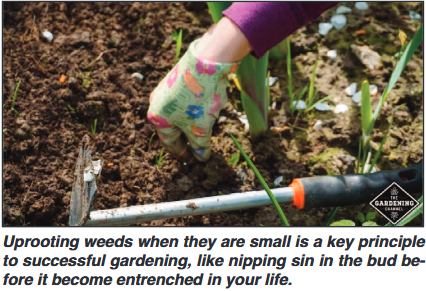 “For such are false apostles, deceitful workers, transforming themselves into apostles of Christ. And no wonder! For Saan himself transforms himself into an angel of light. Therefore it is no great thing if his ministers also transform themselves into ministers of righteousness, whose end will be according to their works” (II Corinthians 11:13-15).
“For such are false apostles, deceitful workers, transforming themselves into apostles of Christ. And no wonder! For Saan himself transforms himself into an angel of light. Therefore it is no great thing if his ministers also transform themselves into ministers of righteousness, whose end will be according to their works” (II Corinthians 11:13-15).
Satan, first known as Lucifer, or heylel in Hebrew (“bright morning star”; from halal, “to shine make a show, boast”), is the “son of the morning” in Isaiah 14:12. He wished to supplant or equate himself with almighty Elohim on His throne, and sit in the heavenly seat of government, “… be like the Most High” (Isaiah 14:14). In Ezekiel 28:12-19 he is personified as the King of Tyre, the “seal of perfection, full of wisdom and perfect in beauty. You were in Eden, the garden of God; every precious stone was your covering ….”
As beautiful as Satan was, in the Garden of Eden enticing Adam and Eve to sin (Genesis 3:1-6), his intentions were self-centered and corrupt, wishing to relegate Adam and Eve to death rather than eternal life:
“In the sweat of your face you shall eat bread till you return to the ground, for out of it you were taken; for dust you are, and to dust you shall return” (Genesis 3:19).
He did not want humankind to replace himself as the god of this world (II Corinthians 4:4; Ephesians 2:2; Matthew 4:8-9; John 12:31; 14:30; 16:11). Thus, even to the present day he masquerades as a good, benevolent, just, and merciful being. However, he is in reality a liar (John 8:44), murderer (John 8:44), thief, and deceiver (Genesis 3:13; Revelation 20:10), the champion of sickness and death (Hebrews 2:14), the author of confusion (I Corinthians 14:33; James 3:16). Like bindweed, he presents himself to the world as a beautiful savior, but his fruit is full of deception and destruction. Like bindweed overpowers the carrots, cabbage, tomatoes, beets, and onions of the garden, and the wheat, soybeans, and corn of the field, Satan’s motives are to capture and enslave the world’s people in totalitarian states, making them think they are free when in reality they are captives.
“And He said to them, ‘The kings of the gentiles [following Satan’s lead] exercise lordship over them, and those who exercise authority over them are called “benefactors [euergetes, ‘workers of good, philanthropists’]’” (Luke 22:25).
Like the prideful, vain kings and presidents of the earth, field bindweed looks beautiful on the outside, but within it is bent upon dispossessing the plants around it from their secure niche on the land. It is like the Pharisees of old, whom Jesus severely scorned.
“Woe to you scribes and Pharisees, hypocrites! For you are like whitewashed tombs, which indeed appear beautiful outwardly, but inside are full of dead man’s bones and all uncleanness. Even so you also outwardly appear righteous to men, but inside you are full of hypocrisy and lawlessness” (Matthew 23:27-28).
Field bindweed wants to take over the domain of others, smothering them under its carpet of green, and confiscate the moisture and sunlight that would lead those fruitful surrounding plants to abundant yields of nourishing crops, food to sustain mankind. The weed is concerned only to prosper itself, having no regard for its neighbors except as a support for its twining vines to enable it to steal even more sunlight from those neighbors. Such a motive runs directly against the universal law of love: “You shall love your neighbor as yourself” (Leviticus 19:18; Matthew 22:39).
The Conclusion
Wormwood sage and field bindweed are two species of plants we could do without. However, they teach us important lessons about Satan if we pursue the analogy of this arch-enemy to these weeds. As a gardener and farmer I am faced constantly with the threat of these weeds taking over my land. I have resolved not to allow this to happen. It will not happen as long as I have breath and the ability to go out and eradicate them.
Thus, I keep my hoe sharp, and I prowl the length and breadth of my pasture and garden, seeking these devilish plants. I will not allow them to prosper, or even exist on my farm … in the same way that I attack the sins that might lurk in my life. Old evil habits may try to rear their sprouts above the soil: I will hack them down. Seeds of various sins may wish to germinate and grow: I will root them up as soon as they are detected. A WEED, LIKE A SIN, IS SO MUCH EASIER TO REMOVE WHEN IT IS SMALL THAN WHEN IT HAS SET DOWN ROOTS!
These weeds may look beautiful. Their flowers are pleasing to the eye, and their silvery or heart-shaped leaves may seem innocent and harmless. Yet, given time they will ruin your crops and make the soil of your life unproductive.
We must act upon the sight of these weeds as our heavenly Father did when Lucifer rebelled from his perfection by sinning.
“By the abundance of your trading you became filled with violence within, and you sinned; therefore I cast you as a profane thing out of the mountain of God; and I destroyed you, O covering cherub, from the midst of the fiery stones” (Ezekiel 28:16).
Do you have the strength to cast out Satan and sins from your life once you discover them? Yes you do, with the power of God’s spirit within you. A clean, weedless garden is a beautiful sight to behold. So is a clean, righteous life!
“Husbands, love your wives, just as Christ also loved the church and gave Himself for her, that He might sanctify and cleanse her with the washing of water by the word, that He might present her to Himself a glorious church, not having spot or wrinkle or any such thing, but that she should be holy and without blemish” (Ephesians 5:25-27).

